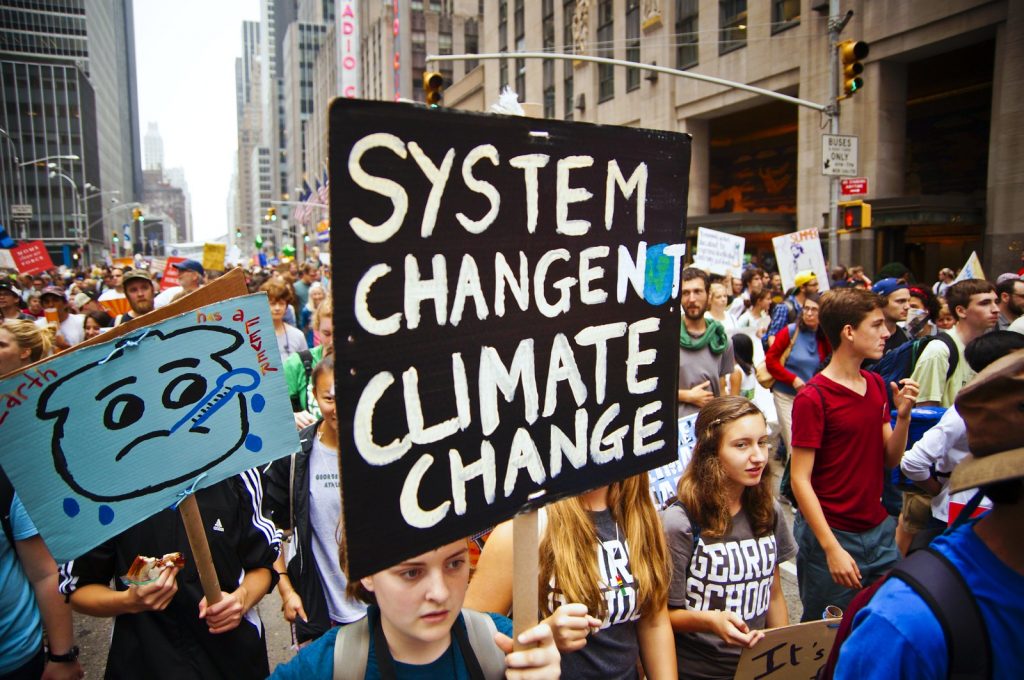Since 1970, according to the UN’s Intergovernmental Panel on Climate Change (IPCC), global surface temperatures have risen faster than in any other 50-year period over the past 2,000 years. The IPCC’s report, while being the first comprehensive climate survey since 2013, merely collects and confirms facts about well-known occurrences, especially as so many people are already experiencing the effects of rapid capitalist-driven climate change.
The report’s key points include the following. The global surface temperature was 1.09 degrees Celsius higher in the decade between 2011–2020 than between 1850–1900. The past five years have been the hottest on record since 1850, and it is “virtually certain” that hot extremes, including heat waves, have become more frequent and more intense since the 1950s. Meanwhile, cold events have decreased in frequency and severity. Other important takeaways are that the rate of sea level rise has nearly tripled compared to the rate from 1901–1971, and that it is 90-percent likely that “human influence” is the main driver of the decrease in Arctic sea-ice and increased glacier melt that is contributing to the rising sea levels.
The IPCC report also puts forward another truth of which many are acutely aware: we are past the point of no return. So many consequences of expansive, profit-driven industrialization are irreversible, and will be with us for the next couple of centuries or millennia. The spate of raging heat waves such as the current one in the Pacific Northwest, droughts that lead to worsened wildfires like those in Greece, and flood-inducing storms such as those in Bangladesh for years now aren’t anomalies; they’re the future.
The IPCC report proposes five possibilities for the future: scenarios with high and very high greenhouse gas (GHG) emissions and CO₂ emissions that roughly double from current levels by 2050 and 2100; a scenario with intermediate GHG emissions and CO₂ emissions remaining around current levels until the middle of the century; and scenarios with low and very low GHG emissions and CO₂ emissions declining to net zero around or after 2050, followed by varying levels of net negative CO₂ emissions. Even under the very low level of CO₂ emissions, global surface temperature averaged over the period 2081–2100 is very likely to be higher by 1.0-1.8°C than those averaged between 1850 and 1900. Even this incredibly ambitious scenario would likely exceed the 1.5°C threshold established by the Paris summit agreement. Global surface temperatures are expected to be 2.1°C to 3.5°C higher in the intermediate scenario and 3.3°C to 5.7°C higher under the very high GHG emissions scenario. Crossing the 2°C global warming level in the mid-term period (2041–2060) is very likely to occur with the very high GHG emissions, likely to occur under the high GHG emissions scenario, and more likely than not to occur in the intermediate GHG emissions scenario.
The 2°C threshold is significant because if Earth reaches 2°C above pre-industrial temperatures, extreme temperature events that occurred once every 50 years in centuries past will probably occur every three to four years. In addition to this increased frequency, there is a much greater likelihood of compound events — that is, two major climate events occurring simultaneously or in close temporal proximity, such as heatwaves and droughts co-occurring or occurring in rapid succession. These sorts of climate events already stress infrastructure; if they happen as compound events, infrastructure will likely collapse under the stress, leading to even more injuries, death, destruction, and displacement.
We’ve already seen examples of how capitalist-controlled infrastructure is simply incapable of dealing with climate catastrophe, such as when a polar vortex generated extreme cold in Texas that pushed south as a result of an interruption to the jet stream caused by climate change. An insufficient, isolated electric power grid was incapable of supplying adequate power residents needed to stay warm.
If corporations remain on their current emissions track, we should expect to see 3°C (slightly more than 5°F) warming by the end of the century. Even if carbon pollution is slashed as rapidly as is feasible, global surface temperature is likely to exceed 1.5°C warming by 2040, a little less than 20 years from now. The IPCC estimates that enough greenhouse gas is already in the atmosphere today to raise the planet’s temperature by 1.5°C, and that the only reason we have not already experienced this temperature jump is that the cooling effects of smog and other forms of conventional air pollution are keeping the temperature depressed.
Even the best-case scenario hardly inspires confidence: it still results in major climate change, the complete irreversibility of sea levels rising, and the remaining carbon budget being fully exhausted in just 11.5 years of 2020-level emissions —and less than that if global emissions rebound and do not decrease.
Many people have taken to Twitter to process their anxiety over “human-induced” climate change. This, however, is not “human-induced” climate change caused by the behavior of individuals.
Conspicuously absent from the IPCC report is that this climate change is all the result of capitalism. Centuries of prioritizing profit over people and the conditions that improve human and planetary health have landed us here, not individuals taking showers for five minutes “too long” or using plastic straws at restaurants. Of course, there are measures that individuals can take to decrease their resource consumption and ecological footprint, but individual behaviors pale in comparison to the absolute havoc that corporations have wreaked on the planet. The 1 percent and the largest corporations continue to be the greatest drivers of climate change and our eventual climate catastrophe.
The United States is part of the IPCC, but the Biden administration hasn’t taken any concrete steps to cut emissions. Critical steps would include agreeing to binding targets or ending all new fossil fuel extraction projects. On Monday, August 9, the Biden administration announced the allocation of $5 billion in funding through the Federal Emergency Management Agency toward helping states and localities prepare for “extreme weather and climate-related disasters.” This does not address any of the root causes of climate change; it simply throws an insufficient amount of money at the problem that cannot possibly address the scope of the death and destruction that wildfires and severe storms will inevitably cause.
The governments that are at the beck and call of the major global corporations that fuel climate change are incapable of making the changes necessary to reduce climate impacts over the next century. What is imperative is a global socialist society that prioritizes the lives and wellbeing of the global working class and oppressed over profits and competition. Creating such a society will require a revolutionary struggle.
We cannot let climate anxiety give way to climate nihilism. We must channel frustration over corporations destroying the environment and preventing future generations from being able to inhabit our planet into fighting for the overthrow of capitalism. We cannot wait for the Democrats to take the bare minimum steps to cut carbon and greenhouse gas emission cuts “just enough” to quell public outrage. We must fight for the immediate nationalization of all transportation, manufacturing, fossil fuel extraction, and energy production under workers’ control; a commitment to halting all fossil fuel use within the next decade; and major investments in new energy infrastructure, public transportation, and environmental conservation.
Let’s not succumb to climate anxiety. Let’s instead commit ourselves to the fight for socialism so we can make the meaningful changes that will help keep the earth habitable — before it really is too late.











